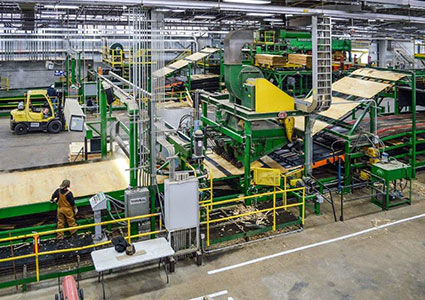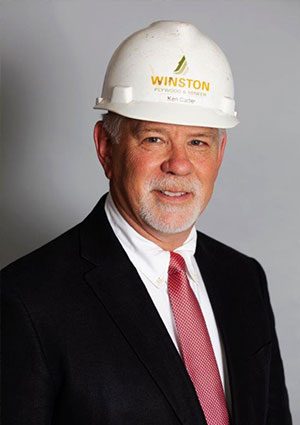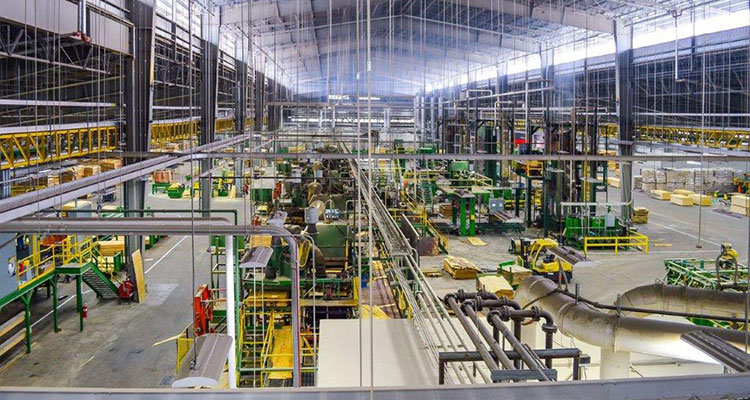Winston Plywood Rebuilds After Tornado in Mississippi
Established shortly after a natural disaster swept through Louisville, Mississippi, Winston Plywood and Veneer has played a vital role in revitalizing the local community and reinstating its industrial roots. As Vice President, Ken Carter, begins: “Founded in 2015, we are one of the newest plywood mills in the American South. The company is owned by Atlas Holdings out of Greenwich, Connecticut, and the plant site here in Louisville has been sacred ground for wood products since the early 1900’s, starting with the Fair Lumber Co.
“Georgia Pacific moved to Louisville in 1964 and built a triplex manufacturing plant to include a plywood mill, particleboard mill, and chemical plant. Georgia Pacific shutdown for good in 2008, and in 2013 a company out of the Northwest came in and was in the process of trying to bring the old plant back to life. They saw an opportunity, due to the large timber resource that was still available in the area.
 “Unfortunately, a large F4 tornado hit Louisville and destroyed the old plant site along with all the equipment that was still in the building. Luckily no one was injured in the plant, but ten lives were lost in Louisville and the surrounding area. Atlas Holdings came to the rescue and decided to build a new plant where the existing plant used to stand. Demolition started almost immediately. Construction of the new plant started in 2015, and it was fully operational by 2017 as Winston Plywood & Veneer.
“Unfortunately, a large F4 tornado hit Louisville and destroyed the old plant site along with all the equipment that was still in the building. Luckily no one was injured in the plant, but ten lives were lost in Louisville and the surrounding area. Atlas Holdings came to the rescue and decided to build a new plant where the existing plant used to stand. Demolition started almost immediately. Construction of the new plant started in 2015, and it was fully operational by 2017 as Winston Plywood & Veneer.
“I’m originally from Winston County, so my roots are deeply grounded here. I had the opportunity to work for Georgia Pacific in my early years, and I was the plant Electrical Supervisor and later Electrical Superintendent. I left when the plant shut down for a brief period in 2002. During this time, I took a position with Nissan North America in Canton, MS. I worked there for 13 years as the plant Maintenance Senior Manager. Then, I took an early retirement opportunity to move back home and help rebuild the plywood mill.
“I started in April of 2015 as the Maintenance Manager helping to build the plant back. I focused mainly on the electrical and mechanical installations and design, since that was my specialty. I also focused on hiring a qualified maintenance team to help staff the mill for future production support. Once the plant started production, I accepted the position as Plant Manager and held that position until early 2021. Today, I oversee operations as Vice President. We make southern yellow pine plywood in one to two inch, three to four inch, five to eight inch, and one inch units. We also sell our dry high-density veneer to multiple LVL plants for engineered lumber.”
Latest technology
With strong personal ties to the region and its community, Ken takes a personal approach to business: “I believe that manufacturing is all about people. It takes a team effort to make a plant like this successful. I believe in treating our employees with respect and dignity. These are very labor-intensive jobs and require long hours at times to get the product out the door. I appreciate all the hard work and dedication our employees give every day.
“Through their hard work and dedication, we’re able to ship quality products to our customers. We demonstrate a high level of care and consideration when it comes to the quality of the product we put into the world. It’s also key that we provide our customers with reliable service, as getting products delivered on time and in good condition is absolutely vital to our success,” he asserts.
As one of the most advanced lumber mills in the region, Winston Plywood and Veneer makes use of the latest in automation and manufacturing technology. Ken

discusses the process from start to finish: “We have a very high-tech plywood mill. We either buy logs from private companies, or work with buyers to acquire the material, as we don’t currently own any forest land ourselves. It’s quite easy to find supplies around here, we have a strong timber base, and I’ve worked in the area for a long time, and we have close ties to the community. Once procurement is complete and we have the materials onsite, we scale each log to ensure it is within certain size parameters. It then goes into our log yard, where we can keep it preserved for some time.
“When we’re ready to begin processing, we look at the rings per inch. This gives us information about the density of the wood, which in turn will decide the quality of the timber. A tree with tight rings has higher density, and we’ll get more money for it.
“We then take the materials into the hot deck, where they are debarked and cut to size. Our standard length is a little bit over eight feet. Once they are correctly sized and shaped, we move them to the steam vault. We have 14 big steam chests, where the core temperature of the wood is brought up to 100 degrees. They then go through the lathe and the clipper, producing nice four by eight sheets of veneer.
“The automatic stacker then moves the materials into the dryers. The drying process takes around seven minutes, and once that’s done, the veneer is returned to the automatic stacker. It’s assessed for dryness and density and given a quality grade. Using this grade, we then sell and deliver the material.”
Ten years since its inception, the business shows no signs of slowing down. As Ken concludes: “The coming year is looking very promising for us. We recently installed some new equipment on our presses to help speed up production and help with quality control. We also have several upcoming capital projects that we will be looking at for 2025, all around overall equipment effectiveness. Looking further down the line, we do have plans for further expansion in the next five years or so. Our focus will be on increased production and safety, and continuing to ensure we have the right team in place to deliver the high-quality products we’re known for.”
